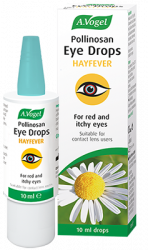An introduction to earache and hayfever
Earache is not the most common symptom of hayfever and is usually an indication of sinus congestion or an ear infection. Earache can also occur when the membrane lining of the Eustachian tube in the middle ear becomes inflamed as it reacts to pollen. This can cause an imbalance in pressure in the ear resulting in feelings of blocked ears.
Why does hayfever cause earache?
Not every sufferer of hayfever experiences earache. However, for those who do, it can be one of the most inconvenient symptoms as it can not only be extremely painful but also begin to affect your hearing.
Earache comes as a result of your body reacting to pollen as if it were a harmful substance. The chemical histamine is released and mucous membranes lining the nasal cavities and ears become inflamed. This can cause a blockage in the ears and prevent fluid or mucus from draining away. This then leads to pressure building up inside the ears.
However, it is also possible for an infection to develop in the middle ear. This is more common in children whose Eustachian tubes are less developed. Often an ear infection will clear up by itself; however if you are concerned about your condition or are suffering from a recurring ear infection, this should be checked by a doctor.
What home remedies are there for earache?
There are several home remedies available for treating earaches, many of which use simple ingredients found in your cupboard at home.
- Relieving congestion in the ear may help to ease your earache. This can be achieved by inhaling steam or menthol. This helps to open the Eustachian tube so that any fluids inside the middle ear are able to drain away.
- Equalising the pressure in your ear may also help to ease hayfever induced earache. This can be achieved by yawning, chewing gum or holding your nose and blowing until your ears pop. However, you should be very gentle when doing this so that you do not damage the delicate structures of the ear.
You should be careful before putting anything into your ear, particularly if you suspect you are suffering from a perforated eardrum, as this can worsen the condition.
Herbal remedies for earache
If your earache is caused by hayfever, then treating the underlying problem is most likely to bring you effective relief for this and other symptoms. Pollinosan Hayfever Tablets are made to an original A.Vogel recipe and combine several herbs to target the effects of the body’s abnormal reaction to hayfever.
If you are looking for a herbal remedy specifically to target earache, then Plantago is often found to be effective. It is thought to reduce inflammation of membranes in the upper respiratory tract, and also to contain naturally occurring antibiotics. It is for this reason that it is often found to be effective in the treatment of ear problems.
What about conventional medicines?
Initially, a doctor or pharmacist is likely to recommend anti-histamines to help to ease all symptoms of hayfever and a nasal decongestant to help clear the Eustachian tubes. However, if your earache persists, they may check for signs of infection. If this is the case, your doctor may prescribe antibiotics or drops.




 Looking for relief of red and itchy eyes due to hayfever?
Looking for relief of red and itchy eyes due to hayfever?

